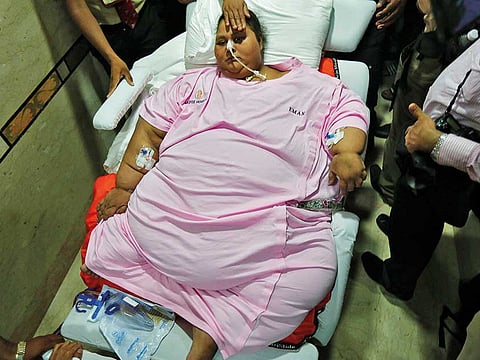Eman’s family appreciate respect for privacy
Sister says that she is grateful for the care provided by treating doctors and medical staff in the UAE

Abu Dhabi: Eman Abdul Atti has been in the UAE for nearly a week, and her family is delighted at the level of compassion she has received so far.
Once billed as the heaviest woman in the world, the 36-year-old Egyptian is now being treated at the Burjeel Hospital Abu Dhabi.
“We are very grateful for the way doctors and staff at the hospital respect my sister and her privacy,” Abdul Atti’s sister, Shaima Selim, 34, told Gulf News.
“I just hope God will show the doctors and us how to help my sister and make life better for her,” she added.
Abdul Atti’s bedridden plight first received public attention when her family posted a desperate plea for help online to Egyptian president Abdul Fattah Al Sissi. But her subsequent treatment at a Mumbai-based hospital became mired in scandal with disputes about her weight loss.
According to treating doctors, Abdul Atti reportedly weighed 500kg in February, and had lost weight to reach 176kg after bariatric surgery. Selim however disputed the claim, telling Gulf News then that her sister still could not sit, eat on her own or go to the toilet.
Abdul Atti’s family then reached out to doctors at Burjeel Hospital as they had initially visited her in Alexandria offering treatment. She was flown to Abu Dhabi on May 4, and at a press conference held soon after, treating doctors at the private hospital in the capital called for greater respect for Abdul Atti’s privacy.
“It not a priority for us to talk about [her weight],” Dr Yassin El Shahat, chief medical officer, had said, brushing aside repeated queries on the subject.
“[Her weight] is not the most important problem right now for Abdul Atti, and [even though] it is a controversy it is not our priority [to talk about it]. We plan to reduce her weight gradually by conservative management techniques. This lady is here for treatment. We must respect her family’s requests for privacy [and follow the UAE’s conventions on patient confidentiality],” he had said firmly.
Dr El Shahat had also said ensuring Abdul Atti’s mental well-being was also one of the hospital’s key concerns.
Doctors had added then that Abdul Atti had arrived with a fever and had pressing medical concerns that require urgent treatment, including severe urinary tract infection, bedsores and leaking heart valve. They hoped to gradually introduce oral feeding for the patient, and eventually to enable her to sit up in a chair.
Sign up for the Daily Briefing
Get the latest news and updates straight to your inbox


